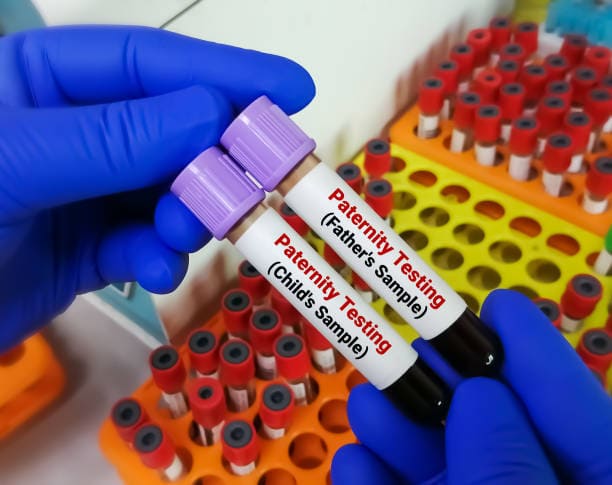Court-Ordered Paternity: How Long Does the Legal Process Take?
Table of Contents
- Introduction: Understanding Court-Ordered Paternity
- What is Court-Ordered Paternity?
- How Long Does Paternity Take Through Court?
- Factors That Can Affect the Timeline
- How is a DNA Test Used in Paternity Cases?
- What Happens After a Court Rules on Paternity?
- What If the Father Denies Paternity?
- What Happens If the Father Refuses the DNA Test?
- The Importance of Legal Representation in Paternity Cases
- Conclusion: Take Control of Your Paternity Case
Introduction: Understanding Court-Ordered Paternity
Concerning child support, inheritance rights, and custody, one of the most essential matters that must be established is paternity. Whether you are a mother seeking child support, a father who wants to know whether he has parental rights or a child looking to assert your legal connection to your biological father, a court-ordered paternity test is often the most reliable and legally binding way to establish paternity.
However, many people in this situation ask, “How long does paternity take through court?” The legal process for establishing paternity can be complicated, and the timeline can vary depending on several factors. This article is designed to provide an in-depth overview of how long the paternity process typically takes through the courts, the steps involved, and the key factors affecting the timeline.
At the end of the article, we will also answer five essential questions that frequently arise in paternity cases. We will provide valuable information to help you understand what to expect during the paternity process.
By the time you finish reading, you will have a much clearer idea of how paternity is established, how long it takes, and how to navigate the legal system to protect your rights.
What is Court-Ordered Paternity?
Court-ordered paternity is a legal process where a court determines the biological father of a child when there is uncertainty, dispute, or need for clarification regarding the father’s identity. In some cases, the parents may not be married or may disagree about who the father of the child is. Paternity can also be challenged, or a man may wish to assert his paternal rights to access the child.

In these cases, the court often orders DNA testing to establish paternity. A court-ordered paternity test typically involves the mother and the alleged father providing biological samples—usually a cheek swab or sometimes blood samples—that are tested in a certified lab to compare the genetic markers between the child and the father.
Once the DNA results are in, the court will either confirm or deny the paternity of the alleged father. If the test confirms that the man is the biological father, the court may establish child support obligations, visitation rights, and custody arrangements. If the man is excluded as the father, the case will be dismissed, and no further commitments or responsibilities will be placed on him.
While the DNA test is usually highly accurate, the paternity process can take several months. The timeline depends on the steps required, the speed of the court’s docket, and any delays caused by disputes or complications.
How Long Does Paternity Take Through Court?
There is no simple answer to the question, “How long does paternity take through court?” Several factors can affect the timeline, and each case is different. On average, however, the entire paternity process can take two to six months from the moment the petition is filed until a court ruling is made.
Here is an in-depth breakdown of each phase of the paternity process and the general timeline involved.
1. Filing the Petition
The first step in establishing paternity is filing a petition with the court. This petition is generally filed by the mother, the alleged father, or even the child (if they are old enough). The petition may request the court to establish paternity, which involves asking for a DNA test to determine whether the alleged father is the biological father of the child.
Once the petition is filed, the court typically reviews it, and a hearing date will be set. Filing the petition usually takes just a few days to a week.
2. Court Scheduling
After the petition is filed, the court will schedule a hearing to consider it and order DNA testing. At the hearing, the judge will review the petition and determine the next steps in the case.
Scheduling a hearing can take some time. Courts are often busy, and there may be delays in scheduling a hearing, especially in high-volume areas. The waiting period can range from two weeks to a few months. Courts may schedule hearings for several months in some jurisdictions due to a heavy caseload.
3. DNA Testing

Once the hearing is scheduled and the court has ordered DNA testing, the process can move forward more quickly. The DNA test usually involves a noninvasive cheek swab, which can be done in minutes. DNA samples are then sent to a certified lab for analysis.
The lab typically takes two to four weeks to process the DNA samples and return the results. This wait time may vary depending on the laboratory’s workload, but it doesn’t generally take more than a month.
4. Court Ruling
Once the DNA test results are received, the court will review the evidence and make a ruling. A hearing is scheduled for the judge to officially declare whether the alleged father is the biological father of the child. This is where the official paternity ruling is made.
The hearing to review the DNA test results and make a ruling can take two to four weeks after the results are submitted. The timing may vary depending on the jurisdiction and the court’s schedule.
5. Post-Ruling Proceedings
Once paternity is established, additional legal proceedings may be necessary, such as determining child support or making decisions about custody and visitation. These steps may require additional hearings and discussions, especially if there are disagreements between the parties involved.
Depending on the case’s complexity, these proceedings can take several weeks to a few months. If custody or child support arrangements are contested, the case can take longer to resolve.
Overall, establishing paternity can take anywhere from a couple of months to six months or more, depending on the case’s complexity and other factors.
Factors That Can Affect the Timeline
As we’ve seen, the timeline for paternity cases can vary significantly. Some cases may be resolved quickly, while others can take much longer. Several factors can affect how long it takes to establish paternity, including:
1. Court Delays
Court delays can significantly extend the paternity process in jurisdictions with heavy caseloads. It’s common for courts to schedule hearings several months out, especially in larger cities or counties with high numbers of family law cases. Court backlogs can add substantial delays to the timeline.
2. Disputed DNA Results
If either party disputes the DNA test results, it can significantly delay the process. In some cases, additional DNA tests or expert testimony may be required to settle the dispute. This can add months to the overall timeline as the court reviews the evidence and resolves the conflict.
3. Uncooperative Parties
Sometimes, the alleged father may refuse to cooperate with the DNA testing process. This can delay the entire case. If the alleged father is difficult to locate, refuses to provide a DNA sample, or challenges the legitimacy of the test, it can extend the timeline significantly. The court may need additional legal action to compel compliance, which can delay proceedings.
4. Complexity of the Case
In some situations, paternity cases can become more complex due to other legal issues. For example, the case may take longer to resolve if there are child custody disputes or existing legal matters such as divorce proceedings. Complex legal problems, such as custody or visitation rights challenges, can add several months to the timeline.
5. State-Specific Procedures
Each state or jurisdiction may have rules and procedures for handling paternity cases. Some states may have more streamlined processes, while others require additional steps or documentation. Understanding your state’s requirements can help you better estimate how long the paternity process will take.
How is a DNA Test Used in Paternity Cases?
DNA testing is the most reliable and scientifically accurate method for establishing paternity. In a paternity case, the court typically orders DNA testing for the mother, the child, and the alleged father. Here’s how the DNA testing process generally works:
1. Collection of Samples

The first step is to collect DNA samples from the involved parties. This is typically done through a noninvasive cheek swab, although in some cases, blood tests may be used. The samples are collected by a certified professional, such as a nurse or technician, and then sent to a laboratory for analysis.
2. Analysis by a Certified Laboratory
Once the samples are collected and sent to a certified laboratory for analysis, the lab will compare the genetic markers between the child and the alleged father. This process helps determine whether the suspected father shares enough genetic material with the child to be considered the biological father. The accuracy of these tests is over 99.9% when the father is the biological parent, or the test will exclude him if he is not.
3. Results and Reporting
After the lab completes its analysis, it will provide the paternity results to the court in a report. This report is crucial for the court’s ruling on paternity. In most cases, the results are clear and definitive, allowing the court to make a timely decision.
What Happens After a Court Rules on Paternity?
Once the court has made a ruling on paternity, several critical legal consequences can follow:
1. Child Support
In most cases, the court will order the biological father to pay child support to help with the child’s financial needs. This support can cover various expenses, including medical costs, education, and day-to-day living expenses.
2. Custody and Visitation

The court may also address custody and visitation arrangements if paternity is established. The biological father may seek shared custody or visitation rights, or the court may establish a formal arrangement based on the child’s best interests.
3. Legal Rights
Once paternity is confirmed, the child may be entitled to inherit from the father, receive health insurance benefits, and access other legal rights afforded to children of legal parents.
4. Government Benefits
Depending on the father’s eligibility, the child may also be entitled to receive benefits such as Social Security, veterans’ benefits, or other government assistance through their biological father.
What If the Father Denies Paternity?
The situation becomes more complex in cases where the alleged father denies paternity. However, the court still has the authority to order DNA testing, and refusal to comply can result in legal consequences. If the DNA test excludes the father, the case is typically dismissed. If the test confirms paternity, the court will proceed with establishing child support, custody, and visitation.
What Happens If the Father Refuses the DNA Test?
If the alleged father refuses to take the DNA test, the court has the power to compel him to do so. The court may issue a legal order requiring the father to submit to the test. Failure to comply with this order can lead to consequences, including contempt of court charges or other penalties. In some cases, the court may rule in favor of the mother, assuming that the father is the biological parent.
The Importance of Legal Representation in Paternity Cases
Given the complexities involved in paternity cases, having legal representation is crucial to ensure your rights are protected. A family law attorney can guide you through the process, handle disputes, and help you navigate the legal complexities that can arise.
Conclusion
If you’re facing a paternity case, whether as a mother, father, or child, it’s essential to understand the legal process and timeline involved. Knowing the steps, how long each phase takes, and the potential factors that can delay the process can help you make better decisions and prepare for what lies ahead, At The Law Office of Bobbie Young, our dedicated team is committed to protecting your best interests and helping you achieve a favorable outcome.

If you are facing a paternity case, don’t face it alone. Contact us today to schedule your consultation to get expert legal guidance. We are here to help you every step of the way. Reach out now to schedule a consultation and ensure your paternity case is handled efficiently and professionally.
Your Legal Solution Starts Here
Clear, practical legal advice you can count on when it matters most